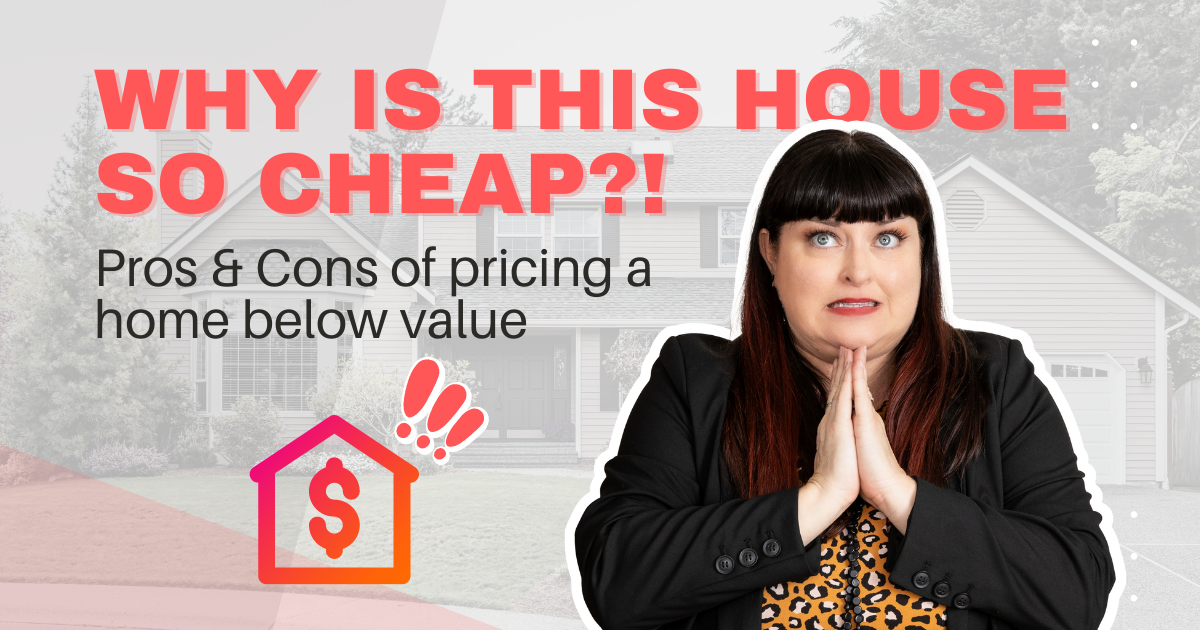When browsing through real estate listings, you might have come across a house that seems surprisingly affordable. You may wonder, “Why is that house so cheap? What’s wrong with it?” Well, there are indeed reasons for underpricing a home, and in today’s competitive real estate market, some listing agents and sellers opt for this strategy. In this blog article, we’ll delve into the pros and cons of pricing a home low in real estate and explore why this tactic is used and how it can affect both sellers and buyers.
Why Underpricing Occurs in Today’s Market
In a real estate market where demand is outpacing supply, underpricing has become a popular strategy for some sellers and listing agents. The main motivations behind this approach include:
- Quick Sale: Underpricing can attract more potential buyers, leading to a faster sale of the property. This is particularly appealing to sellers who want to expedite the selling process.
- Generating Multiple Offers: By setting a low price, sellers hope to create a sense of urgency among buyers, potentially resulting in multiple offers. This competitive environment could drive up the final selling price.
Pros for Sellers
The benefits of underpricing for sellers include:
- Faster Sale with Fewer Concessions: An attractively low price can attract serious buyers quickly, reducing the need for sellers to make extensive concessions during negotiations.
Cons for Sellers
On the other hand, underpricing also comes with some significant drawbacks for sellers:
- No Guarantee of Multiple Offers: While the hope is to incite bidding wars, there’s no assurance that multiple offers will materialize. In some cases, this strategy might backfire, leaving the seller with fewer offers than expected.
- Raising Red Flags: A suspiciously low price can raise concerns among potential buyers who may question the property’s condition or wonder if there are hidden issues.
- Potential Loss of Value: Setting the price too low might mean sellers don’t receive the full value of their home, resulting in financial losses.
Pros for Buyers
Buyers might find some advantages in considering underpriced homes:
- Perceived Good Deal: A lower price can make buyers feel like they’re getting a great deal, which can be an attractive proposition.
Cons for Buyers
However, buyers need to be cautious when dealing with underpriced properties:
- Increased Competition: A low-priced home can attract a large number of interested buyers, leading to a competitive and stressful bidding process.
- Unforeseen Costs: Buyers may discover that the initial low price was misleading, as they end up paying more than they anticipated due to competing offers and rising prices.
- Waiving Contingencies: In hot markets, buyers might feel pressured to waive important contingencies, like inspections or appraisal gaps, to strengthen their offers, which could lead to potential risks in the long run.
Final Thoughts
Pricing a home low in the real estate market can be a risky strategy for both sellers and buyers. While it might lead to a faster sale and generate multiple offers, there are no guarantees, and it can raise red flags among potential buyers. Buyers, on the other hand, may feel they’re getting a good deal initially, but they must be prepared for increased competition and unforeseen costs down the road.
Ultimately, the decision to underprice a property should be made carefully and in consultation with a knowledgeable real estate agent. Experts like the Hatch Homes Group can provide valuable insights into the market, helping sellers determine the best pricing strategy and assisting buyers in making informed decisions.
Whether you’re a seller or a buyer, understanding the pros and cons of underpricing in the real estate market is crucial in navigating today’s dynamic housing landscape. Remember, knowledge is power, and with the right guidance, you can make the most of your real estate journey.
Tune into this weeks video to join Michele and Randolf as they dig into it further:

